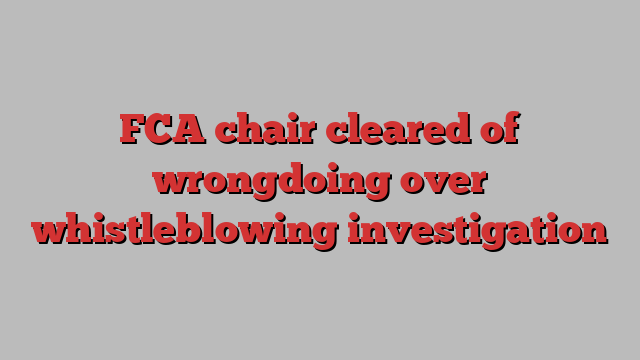
FCA chair cleared of wrongdoing over whistleblowing investigation
Unlock the Editor’s Digest for free
Roula Khalaf, Editor of the FT, selects her favourite stories in this weekly newsletter.
The chair of the UK’s financial watchdog has been cleared of wrongdoing over his handling of a whistleblower complaint following an internal investigation.
Financial Conduct Authority chair Ashley Alder came under fire in August after it was reported by the Financial Times that he had forwarded correspondence from a whistleblower that included the complainant’s name and details, despite the FCA’s whistleblowing policy not to reveal such information.
Alder “did not follow the [whistleblowing] policy to the letter . . . [but] his aim was simply to ensure that appropriate action was taken” in respect of the complaints, according to a report by the FCA’s senior independent director Richard Lloyd, published on Monday.
The whistleblower was dismissed from the regulator in 2021 for alleged misconduct, and lost an employment tribunal case against the authority, a decision they were appealing against at the time the complaint emerged.
Following the allegation, a second individual came forward with a similar complaint over how Alder had handled their own disclosure, the report said. Both individuals were former employees.
“I take our responsibilities to whistleblowers very seriously,” Alder said in a statement on Monday.
“These were unusual and complex cases involving two employees who had left the FCA some years ago and who have raised a range of issues over an extended period of time . . . I wanted to ensure that, as non-executive chair, I was in the best position to act on the concerns of both individuals,” he added.
The FCA said its internal whistleblowing policy “states that an individual’s identity will not be revealed without their consent, other than in exceptional circumstances”.
But it added that an internal whistleblower will usually be told their complete anonymity cannot be guaranteed, “particularly for example where there is a legal duty on the FCA to involve others in the investigation of allegations or for safeguarding purposes”.
Alder’s decision to forward the whistleblowers’ emails to colleagues showed he “reasonably took the view that he was providing information to them of which they were already aware, in order to request advice on the range of matters they contained and to ensure that these were correctly addressed and progressed”.
The FCA said its chair “routinely consults senior managers on sensitive matters, including obtaining legal advice”. It added that the substance of both whistleblowers’ complaints “has been or is being dealt with through legal proceedings or other processes including internal investigations by appropriate teams within the FCA”.
The regulator said it had already been reviewing its whistleblowing policy, “some of its content previously having been identified as somewhat impractical” and the results of this process would be published shortly after drawing on “relevant matters from this review”.
It added that board members and senior officials had been “reminded of the existing policy” and the findings of the review had been accepted in full by the chair and the “whistleblowing champion”.






